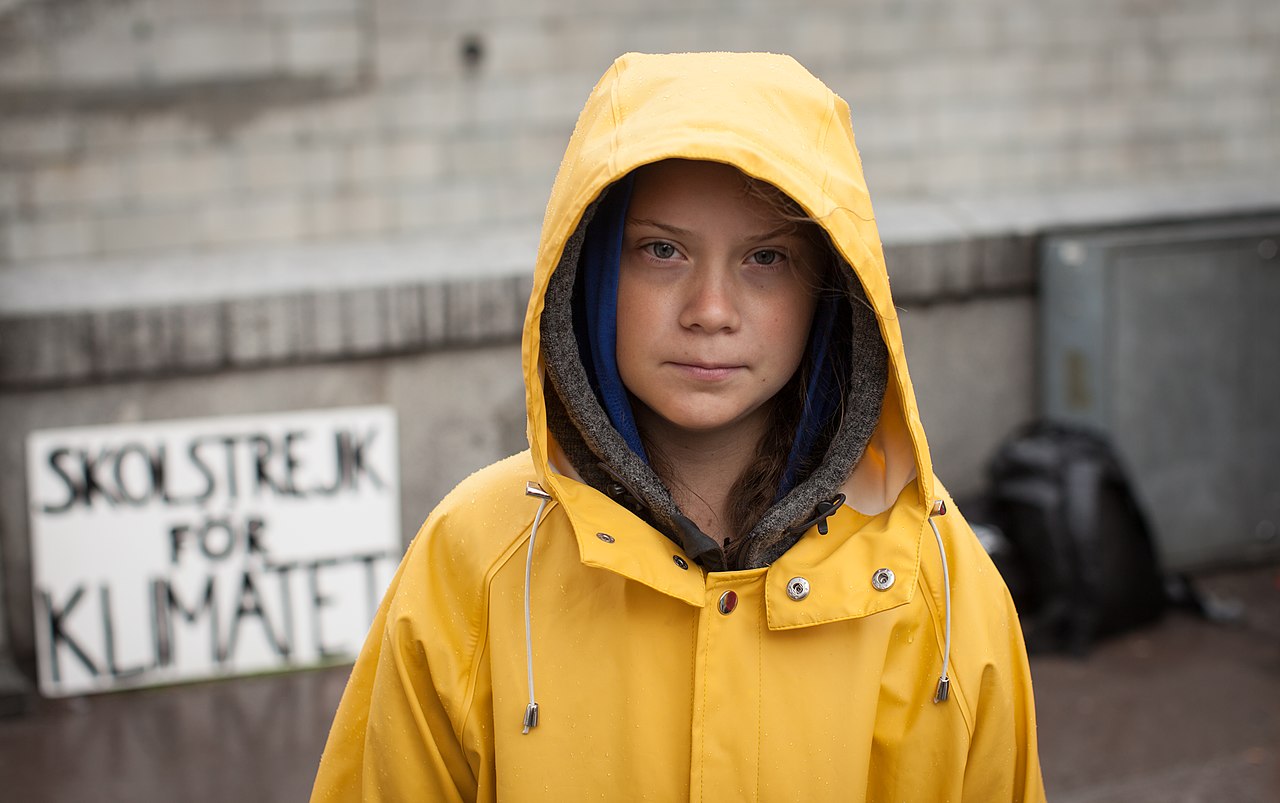By Craig Collins
In a recent interview (TruthOut, Sept. 17, 2019) with Amy Goodman, Naomi Klein linked Greta Thunberg’s autism with her powerful commitment to combating climate chaos. In doing so, I believe she promoted a serious misunderstanding about how autism is linked to Greta’s moral clarity on this existential threat. In the interview quoted extensively below, Klein talks about autism and the human brain’s propensity for “mirroring.”
Klein portrays mirroring as a basically negative mental quality that has become a “huge problem” for most people because it keeps them distracted by the complacencies and opinions of others. She believes Greta Thunberg’s reduced impulse to mirror allows her to stay focused and committed to her cause. I disagree with Klein’s understanding of mirroring. I also reject her belief that Greta and others with her form of autism have a reduced capacity to mirror.
Mirroring is the very foundation of our ability to empathize with other people and living things. Our brain’s mirror neurons help us identify with the feelings of others. Mirroring gives us the ability to walk a mile in their shoes, to see the world from their perspective. In short, mirroring allows us to give a damn. Greta’s autism does not limit her capacity to mirror or feel empathy. Instead, it gives her the unwavering, obstinate mental focus to empathize deeply with the pain and suffering caused by something so scary, overwhelming, and conflicting that most people prefer to ignore it.
Here’s what Klein had to say:
“But one of the things that’s really interesting is that therapists talk about how kids on the spectrum don’t do something which most kids do, which is called mirroring. Right? So, most kids, like if you play a game of Simon Says — right? — they get it right away. You move, I move, and we mirror. That’s something that humans do. We’re constantly mirroring each other. We’re looking to one another for social cues to tell us how to act. That’s how we build relationships and cohesive communities. A lot of kids on the spectrum just don’t have that instinct. They don’t have that impulse. They just do their own thing, right? Which is why they get bullied, because they’re following their own path.
So, what’s interesting to me, as it relates to the climate crisis, is that I think this — the fact that we do mirror each other has become a huge problem, because we live in a culture, in an economy, that, on the one hand, is telling us we’re in the middle of this existential emergency — and, you know, we see footage of Arctic sea ice loss, and we hear about an insect apocalypse, we hear about a million species facing extinction — but then, the next minute, it’s like, well, go shopping, you know, watch a makeup tutorial on YouTube, imitate celebrities, so — and politicians talking about pretty much everything except for this, as Greta has said. So, if your impulse is to mirror, you’re getting very conflicting messages. You’re like, “Is this a crisis or not? Because, you know, I’m hearing a message that it’s a crisis, but everywhere I look, I’m getting the opposite message: ‘Everything is fine. Continue as usual. Keep the system going.”
And so, I think what’s so interesting about Greta — and she’s not the only young person on the spectrum who is playing a leadership role in this movement — is that it’s precisely because they lack that impulse to look to other people to tell them the right way to feel about this, that they trust their initial instinct… So I think that’s part of why Greta is playing this prophetic role, because she trusted her first instinct, and she’s not mirroring this insane society.”
Klein says, “the fact that we do mirror each other has become a huge problem.” Yet mirroring is crucial for people to empathize with each other and the plight of the planet. Neuroscientists believe the mirror neurons in our brains are essential to our capacity to identify and empathize with others. We are not the only creatures with mirror neurons. Scientists studying animal behavior have found that many species besides humans—like elephants, dolphins and dogs—possess mirror neuron systems that give them the capacity for empathy.
So mirroring fosters empathy. This makes me wonder about Klein’s explanation for why Greta Thunberg is so committed to the issue of arresting climate chaos. She says, “I think what’s so interesting about Greta — and she’s not the only young person on the spectrum who is playing a leadership role in this movement — is that it’s precisely because they lack that [mirroring] impulse to look to other people to tell them the right way to feel about this, that they trust their initial instinct.”
But autism doesn’t stop Greta from looking to “other people” to help her determine right way to feel. Her “instincts” about our climate emergency came from the ideas and feelings of other people. She didn’t acquire her understanding or sense of emergency solely through her own direct experience. I think Greta became so committed to this issue because she has two things going for her: laser focus and plenty of empathy.
If Greta’s autism limited her capacity to mirror, wouldn’t she have a hard time feeling the compassion she demonstrates for our planet and everyone who will suffer from climate disruption? Wouldn’t her autistic “instincts” keep her narrowly focused on personal concerns rather than the passion she devotes to broad social issues and collective action? Greta says, “I don’t care about being popular. I care about climate justice and the living planet.” How can you square that compassion with a limited capacity for empathy?
Autism can clearly increase mental focus, sometimes obsessively and despite the opinions of others. And it can cause people to be direct, blunt, and painfully honest. Often autism is accompanied by a heightened sense of fairness. And fairness requires mirroring and empathy!
Klein’s explanation overlooks the growing evidence that autism may not reduce a person’s capacity to mirror or empathize with people and other creatures. A recent article on the subject in The New Scientist concluded: “People with autism seem to have normal “mirror” neurons after all. A popular theory has it that these neurons…don’t work properly in people with autism. Now it looks as though that isn’t so.” Klein’s conclusion also contradicts other well-known examples like Temple Grandin. Her autism and her love for animals inspired her to design a more humane technology for the livestock industry. She explains that she came up with her technology by trying to imagine what cattle experience in the slaughterhouse. Now doesn’t that require empathy?
To listen to the whole interview see:
https://www.democracynow.org/2019/9/17/naomi_klein_greta_thunberg_youth_activists
Callaway, Ewen. “Mirror Neurons Seen Behaving Normally In Autism,” New Scientist (May 12, 2010). https://www.newscientist.com/article/dn18837-mirror-neurons-seen-behaving-normally-in-autism/#ixzz5zpTX7mGr
Craig Collins Ph.D. is the author of Toxic Loopholes (Cambridge University Press), which examines America’s dysfunctional system of environmental protection and the international system’s failure to confront climate chaos. He teaches political science and environmental law at California State University East Bay and was a founding member of the Green Party of California. His forthcoming books: Marx & Mother Nature and Rising From the Ruins: Catabolic Capitalism & Green Resistance reformulate Marx’s theory of history & social change and examine the emerging struggle to replace catabolic capitalism with a thriving, just, ecologically resilient society. [ccollins@igc.org]
Image: Greta Thunberg, outside the Swedish parliament, via wikipedia.










GRETA THUNBERG’S SOCRATIC WISDOM, PASSION, CONSCIENCE, AND COURAGE
Autism, in lots of cases (Greta’s for example), may well be a sign of human evolutionary advancement – a kind of necessary, urgent, Sane, hyper-Attunement to the condition of the planet, counterbalancing humanity’s collective existential alienation and self-consuming consumerism. Greta is thus a kind of Socrates, hoping to lead people out of what Plato called a Cave of Ignorance and Delusion — a cave now trembling with all too imminent implosion. May Greta’s passion and lucidity ignite the enlightenment that may yet save the world’s children from doom and despair. Indeed, let us hope that Greta has more success than Socrates did. After all, as Socrates said to the jury that condemned him, it is not he, but Athens itself, that is on trial. And “Athens” here is a cipher for contemporary humanity. So let us do whatever we can to support Greta and her supporters (including the Dalai Lama), as they try to turn “the climate Titanic” from its current tragic trajectory. You go, girl !!
Did you hear who Time Magazine made person of the year? Its Greta Thunberg. I guess I should have seen that coming. Dana Perino called it! I think it’s great!